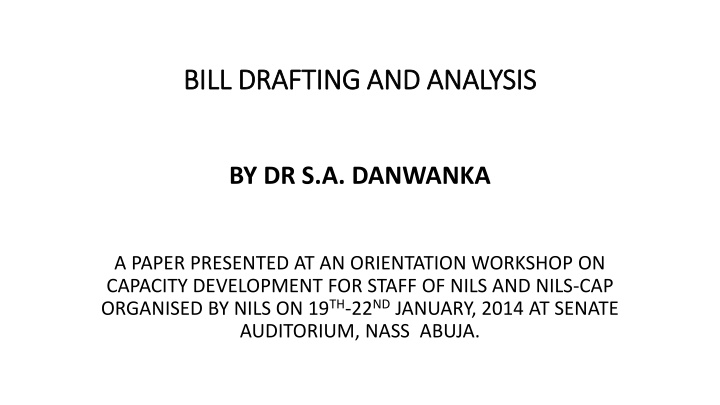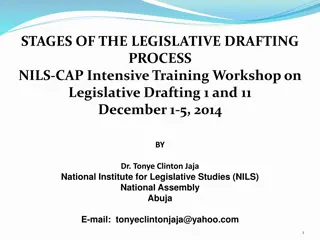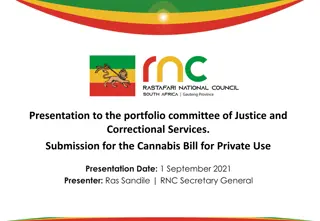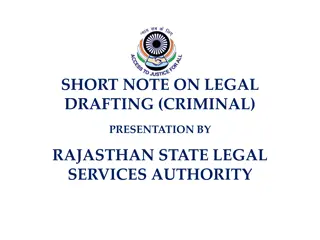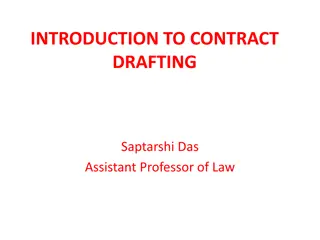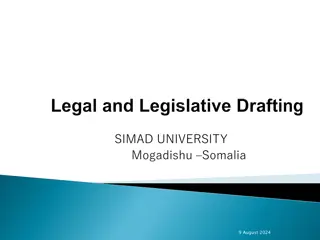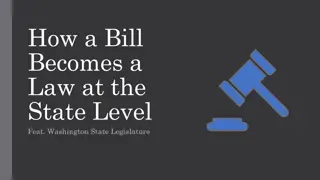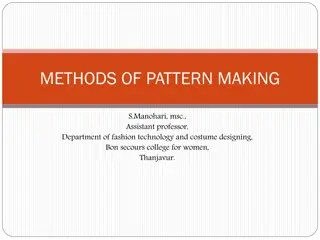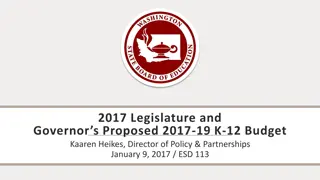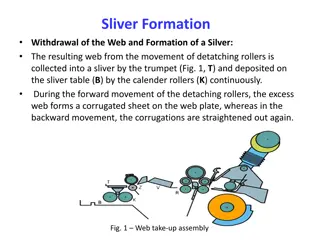Legislative Drafting and Bill Analysis Workshop Overview
This paper presents the highlights of a workshop on legislative drafting and bill analysis organized by NILS. It covers the essential aspects of drafting legislative documents, pre-drafting activities, stages of the drafting process, and the importance of bill analysis. The workshop aimed to share knowledge and experience among participants regarding the principles and practices of legislative drafting in Nigerian parliaments.
Download Presentation

Please find below an Image/Link to download the presentation.
The content on the website is provided AS IS for your information and personal use only. It may not be sold, licensed, or shared on other websites without obtaining consent from the author.If you encounter any issues during the download, it is possible that the publisher has removed the file from their server.
You are allowed to download the files provided on this website for personal or commercial use, subject to the condition that they are used lawfully. All files are the property of their respective owners.
The content on the website is provided AS IS for your information and personal use only. It may not be sold, licensed, or shared on other websites without obtaining consent from the author.
E N D
Presentation Transcript
BILL DRAFTING AND ANALYSIS BILL DRAFTING AND ANALYSIS BY DR S.A. DANWANKA A PAPER PRESENTED AT AN ORIENTATION WORKSHOP ON CAPACITY DEVELOPMENT FOR STAFF OF NILS AND NILS-CAP ORGANISED BY NILS ON 19TH-22NDJANUARY, 2014 AT SENATE AUDITORIUM, NASS ABUJA.
PRESENTATION OUTLINE PRESENTATION OUTLINE Objectives of Presentation. Meaning of Legislative Drafting. Pre- drafting activities. Stages of Drafting Process. Attributes of a Good Legislative Draftsperson. Types of Legislative Enactments.
Meaning of Bill Analysis Sources (Origin) of Bills Types of Bills Objectives of Bill Analysis Guiding principles in Bill Analysis Stages of bill analysis Effect of analysis Reporting Format of Bill Analysis Conclusion
OBJECTIVES OF PRESENTATION OBJECTIVES OF PRESENTATION To highlight general principles of legislative drafting with particular reference to preliminary considerations. To provide a drafting background to Participants especially new staff in the DLSS To highlight the general principles and effect of bill analysis To share knowledge and experience among Participants on current practices and procedure of legislative drafting in various Nigerian Parliaments.
MEANING OF LEGISLATIVE DRAFTING MEANING OF LEGISLATIVE DRAFTING Is limited to drafting legislative documents such as bills, motions, etc. It is restrictive, technical and procedural.
PRE PRE- -DRAFTING ACTIVITIES DRAFTING ACTIVITIES The concept of legislative enactment involve three(3) basic processes- 1. The Policy 2. The Research 3. The Technical Aspect which is drafting the bill.
PRE PRE- -DRAFTING ACTIVITIES CONTD. DRAFTING ACTIVITIES CONTD. Other Issues worth Consideration before drafting: Legislative competence. Compliance with constitutional provisions. Compliance with International law. Recourse to Interpretation Act.
STAGES OF DRAFTING PROCESS STAGES OF DRAFTING PROCESS 1. TAKING INSTRUCTIONS The instruction must state precisely: a) What the problem is, what has given rise to the problem, what attempts has been made to address the problem without the assistance of legislation and why the attempts failed. b) Objectives the proposed legislation intends to achieve. c) Anticipated implications of the legislation. d) All relevant information on the legislation. e) Whether amendment or fresh legislation is needed. f) Appropriate references to decided cases with bearing on the legislative proposal.
2. Understanding the instruction. 3. Research 4. Analysis. 5. Consultation and legal advice. 6. Design/ Outline/ Framework. 7. Composition. 8. Review/ Scrutiny. 9. Submission and Presentation.
ATTRIBUTES OF A GOOD LEGISLATIVE DRAFTPERSON ATTRIBUTES OF A GOOD LEGISLATIVE DRAFTPERSON Preferably but not necessarily a lawyer with sound knowledge and application of the law. Good communication of English. Meticulous, patient, discipline, analytical mind, research oriented. Understanding the working of the legislature, executive, judiciary and other government institutions and their inter relationships. Sound Constitutional knowledge.
ATTRIBUTES OF A GOOD LEGISLATIVE DRAFTPERSON CONTD ATTRIBUTES OF A GOOD LEGISLATIVE DRAFTPERSON CONTD Deep interest in the subject of drafting. Understanding the complexity and dynamics of the society and their people whose obedience to legislative enactments are to be expected. Patience and hard work. Experience.
TYPES OF LEGISLATIVE ENACTMENT TYPES OF LEGISLATIVE ENACTMENT 1. ESTABLISHING ENACTMENTS This type creates a statutory and specialized administrative bodies necessary to run the affairs of the country or state. E.g. National Assembly Service Commission, NNPC, NDLEA, etc.
TYPES OF LEGISLATIVE ENACTMENT CONTD TYPES OF LEGISLATIVE ENACTMENT CONTD 2. AMENDING ENACTMENTS This type alters existing legislation by adding something thereto, or subtracting something from. E.g. The Evidence Act (Amendment) Act, the CFRN 1999 (as amended).
TYPES OF LEGISLATIVE ENACTMENT CONTD TYPES OF LEGISLATIVE ENACTMENT CONTD 3. CONSOLIDATING ENACTMENTS This type consolidates one or more legislations by empowering a single legislation to contain some powers that are scattered in different statutes. E.g. The Nigerian Law Reform Commission Act.
TYPES OF LEGISLATIVE ENACTMENT CONTD TYPES OF LEGISLATIVE ENACTMENT CONTD 4. VALIDATING ENACTMENT This is one made to confer or assure legal or constitutional validity in circumstances where owing to administrative, political or other problems or lapses, doubts about the validity in law of a particular subject matter have arisen. E.g. Is section 2(1) of the criminal Procedure(Amendment) Decree 1966 (No.12) which provides thus: Indictable offence means any offence- a) Which may be punishable by a term of imprisonment exceeding two years; or b) Which on conviction, may be punished by imposition of a fine exceeding two hundred pounds, not being an offence declared by the law creating it to be punishable on summary jurisdiction, but it is hereby declared that the meaning of the expression in the amended definition set out above.
TYPES OF LEGISLATIVE ENACTMENT CONTD TYPES OF LEGISLATIVE ENACTMENT CONTD 5. SUBSIDIARY LEGISLATION This has been defined in section 37 of the Interpretation Act, Cap 192, LFN, 1990, as any order, rules, regulations, rules of court, or bye-laws made in exercise of powers conferred by an Act. Thus, Subsidiary Legislation is a device by which the legislature exercises its discretionary power by conferring discretionary law making power to a subordinate authority.
Meaning of Bill Analysis Refers to a detailed narrative description of a bill including its history, background, sponsor, objective and content analysis. It is updated as the bill moves through the various legislative process Sources (Origin) of Bills: Executive Members Interest Groups/Associations Judiciary.
Types of Bills Public bills (are of general application; affect the targeted group) e.g. Child Rights Act, Land Use Act, Companies and Allied Matters Act etc. Private bills (are of particular interest or benefit of some persons or body of persons) e.g. a bill for an Act that sanctioned compulsory publication of a vacant positions in federal Ministries, Parastatal and MDAS in the national dailies. Hybrid bills (public bills which affect the private interest of particular persons or corporate bodies, e.g. NOSDRA Act, 2006 or a bill that seeks to prohibit gas flaring or a bill that seeks to prohibit prostitution or child trafficking etc).
Objectives of Bill Analysis Provides relevant information concerning a bill Examines the policy and legal implication of a bill Facilitates understanding of a bill Ensure a lively, participatory and robust legislative process
Guiding Principles in Bill Analysis Guiding Principles in Bill Analysis Existing legal, policy, and institutional frameworks Informed and evidence based background Good content structure (sequence, critical analysis consistency and comprehension) Updated, reliable and rich sources Relevant lessons learnt out of cross country experience Definite recommendations with open conclusion Conclusion within time frame to meet analysis objective
Stages of Bill Analysis Second Reading Committees (Standing and Conference) Plenary (Very rare) Effect of Bill Analysis Participatory legislative process, arising from general understanding of a bill Improved committees participation in deliberation and timely reporting Easy passage into law
Reporting Format of Bill Analysis Reporting Format of Bill Analysis Title Sponsor Objective Summary Background International/Cross Country Experience Comments Content analysis Existing legal order Cost benefit analysis Recommendations conclusion
Conclusion Conclusion Bill analysis is a major activity that characterized modern legislative process. It is conducted by legal officers, researchers, committee clerks, clerk of committees, chamber staff, clerk or deputy clerk of parliament or private consultants for technical and specialized bills. In order to consolidate the gains of this exercise, it must be well reported in a format that makes the report reader friendly and easily understandable. Bill drafting is an important exercise that characterized modern legislative process. Bills must be well drafted to facilitate effective legislative process and sustainable democracy
